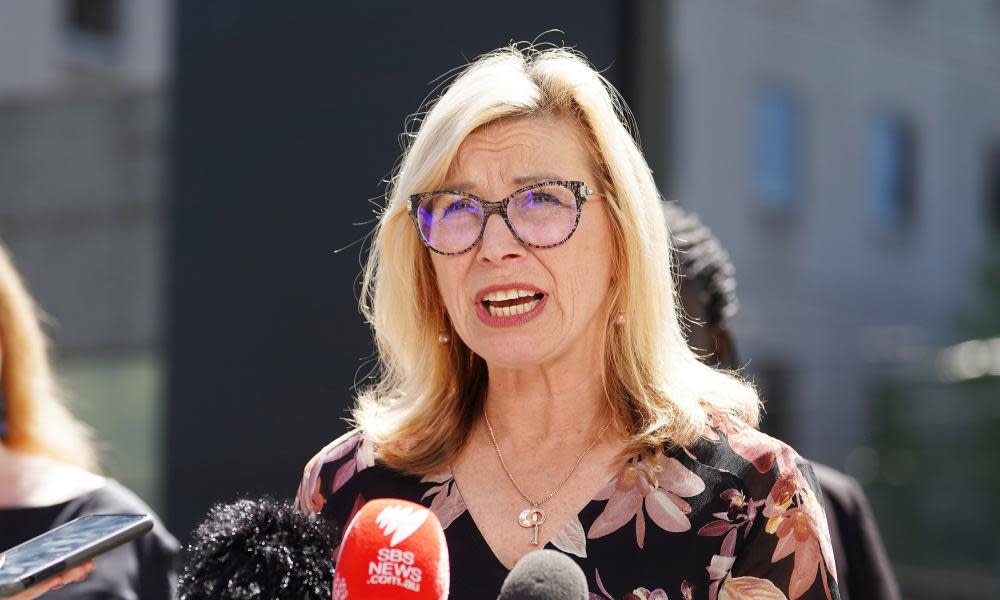Rosie Batty 'dismayed' by decision to give Bettina Arndt an Australia Day honour

The former Australian of the year Rosie Batty has said she is “dismayed” by a decision to award an Australia Day honour to the controversial writer and media commentator Bettina Arndt.
Arndt, a journalist, author and sex therapist, was on Sunday made a Member of the Order of Australia, the third-highest rank in Australia’s civic honours system, in an announcement that has drawn furious criticism from women’s groups.
Batty, a family violence campaigner who was the Australian of the Year in 2015, told Guardian Australia she found the decision to honour Arndt “very unhelpful”, a view she believed most people working towards gender equality would share.
Related: Bettina Arndt awarded Australia Day honour for services 'to gender equity'
“I was completely shocked and then I was quite dismayed,” she said. “I couldn’t help but wonder how it could be that somebody has been rewarded for work … that actually pits men against women.”
Much of the criticism around the decision to honour Arndt has centred around an interview she conducted with the Tasmanian man Nicolaas Bester, a convicted paedophile jailed for grooming and repeatedly raping his 15-year-old student when he was a 58-year-old.
After being released from prison, Bester had boasted about his crimes on an internet forum in 2015, a move that prompted a second conviction.
Two years later, Arndt posted a YouTube video called “Feminists persecute disgraced teacher” in which she interviewed Bester.
In the video, Arndt said some male teachers were vulnerable due to “sexually provocative behaviour from female students” and could then be “subject to false accusations if they reject or offend the young woman in question”.
She also said that young women needed to “behave sensibly and not exploit their seductive power to ruin the lives of men” and in response to Bester’s suggestion his crime was “awesome”, Arndt laughed, adding that it was “pretty stupid” but that “I can imagine how easily this happens”.
Arndt has since apologised for the “relaxed tone” of the interview, while accusing 60 Minutes of selectively editing the video. “I conducted the interview not because I condone his past behaviour but because I am concerned about vigilante justice,” she wrote on her website in 2018.
Bester’s victim, Tasmanian woman Grace Tame, also criticised the decision to honour Arndt on Sunday, telling News Corp that she believed “honouring someone who actively defended a paedophile on a public platform is a blatant example of the protracted, systemic moral corruption that still hampers our society”.
“It is precisely this manner of injustice that strengthens our collective courage and motivation as survivors to share our experiences,” she told news.com.au.
I was shortlisted this yr but did not make finalist list.Bettina winning was a punch to my guts but felt I couldn't post about it without sounding like sour grapes so thanku Rosie for this. FYI I have worked for 18yrs to reduce violence against women &children @jessradio @meadea https://t.co/gSP4X57d0Y
— Rebecca Poulson (@becpoulson) January 26, 2020
Guardian Australia has contacted Arndt for a response to Batty’s comments.
On Friday, she told Guardian Australia she was pleased to be acknowledged for her work, adding that the focus on her interview with Bester had “misrepresented” her more than 45-year career.
“If people are unhappy about my receiving an award because of the Bester issue, I suggest they acquaint themselves with the background to the video,” Arndt said.
“Perhaps they should think about why this issue is being used to misrepresent my very long career. After all, I’ve been out in the media for over 45 years promoting all sorts of controversial issues, seeking fair treatment for both men and women.”
After Nicolaas Bester was released from jail, he took part in an interview with sex therapist Bettina Arndt, portraying himself as the victim. It was posted online for everyone to see including Jane Doe who was traumatised all over again, still silenced by Tasmanian law #60Mins pic.twitter.com/YVlBqOLTQQ
— 60 Minutes Australia (@60Mins) November 11, 2018
Arndt was recognised for her “significant service to the community as a social commentator”, the awards council said. The citation for her honour references a 2018 campus speaking tour, which was called the “Fake Rape Crisis” tour.
The End Rape on Campus Australia founder, Sharna Bremner, on Sunday labelled Arndt’s honour a “slap in the face” to sexual assault survivors.
Batty, meanwhile, likened it to Pauline Hanson’s appointment as deputy chair of a Senate inquiry into family law, a development that has also drawn criticism from family violence groups.
“These are controversial figures that … continue the backlash as we move towards gender equality,” she said.
Contacted by Guardian Australia on Sunday, the chairman of the Australia Day Honours Council, Shane Stone, said the council did not enter into a public discussion about the awards process.


